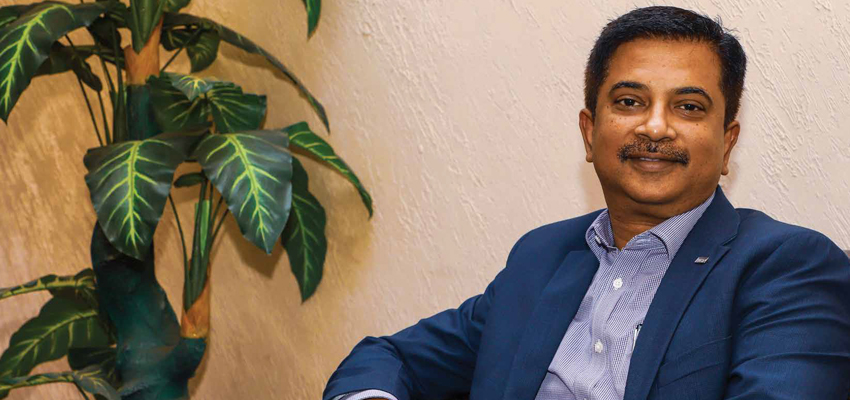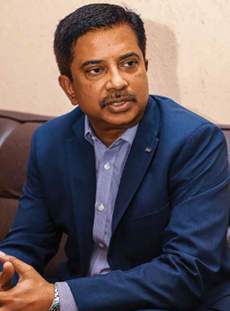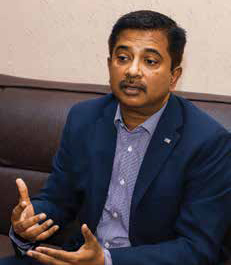Mutual Fund: A Business of Trust

With over two decades of experience in the finance sector, Swarup Mohanty, Chief Executive Officer at Mirae Asset Investment Managers (India) Pvt. Ltd. is a mutual funds market expert and a stalwart of the finance industry. A brilliant leader and motivator, Mohanty in an exclusive interview with Corporate Citizen talks on his keen interest for mutual funds, how India is starting to invest in mutual funds, why millennials inspire him and more
Tell us about your education and career journey.
I think the career journey started when India was liberalising, I was a student then. The idea of a new India struck to me and I shifted to the Commerce stream from Science after class 12. I did not have any plan as such, but I thought Finance was a good option to start my career. Post my MBA, I started working in NBFCs selling FDs (Fixed Deposit) for the respective organisations. From there, Mutual Funds has been a natural progression. I started selling mutual funds in 1997 and from then on, it has been a career of Mutual Funds. I joined Mirae Asset in 2011 as the Head of Sales and was fortunately elevated to my current position of CEO in February 2016.
What are your thoughts on the Union Budget?
My thoughts are simple. If you look at the environment around us, especially the economic slowdown, it has been a balanced budget which has kept the financial prudence in place. Post demonetisation, the effect on Rural India has been real, hence the focus on agriculture and there is a definite need to revive that. One has to also add the reduction of corporate tax which was declared earlier as part of the policy too. The positive impact of the withdrawal of Dividend Distribution Tax is currently underrated.
"To enhance the investing habit of the retail investors in India, the Government could look at providing avenues of retirement products more from the Mutual Fund platform"

You mentioned that the economy has also slowed a bit, what are your thoughts on it?
Actually, the slow down started post-demonetisation 2016. When you pull out cash from a cash-driven economy, the impact is natural. Post-demonetisation, we have slowed down 2-3 per cent. And if you look at the agriculture sector, in two years, the growth rate has fallen to 4.9% to 2.1%. So that’s been the most significant drop and hence the rural slowdown, therefore, the budgets have been agri focussed for the last two years.
India, today, is a consumptionled economy and most of the country’s growth will come from there. Hence, the only disconnect that I have with the budget is due to the withdrawal of all exemptions. They are passing back the cash to the level of economic strata which should be investing rather than spending.
According to the budget, exemptions are going to be removed gradually, India, compared to the west, perhaps has a tendency to save rather than investing in mutual funds or the stock market. Do you think that the removal of exemptions will cause worry among investors?
India’s go-to assets for saving money, have been real estate and gold. The budget is doing two things, first, shifting the onus of investing back to the investor. According to the Budget, the individual should decide whether to opt for the exemption or not. Secondly, as I have said earlier, there is a definite need for the lowest economic strata to invest rather than spend. The risk of financial savings coming down due to the with-drawal of exemptions is large.
As a CEO, what kind of challenges do you face and how do you tackle them?
The main role of the CEO of a Mutual Fund company, I believe, is to perpetually uphold the fiduciary responsibility on behalf of all the investors. The Mutual Fund is a business of Trust. To align the organisation in order to keep the interest of the investor as paramount always, is he way this business should be run. The key is to keep each member and process of the organisation complaint as per the rules and regulations which we are guided by as per the regulations. I am extremely lucky that I work with a team which upholds these values without any compromise. As an organisation, the importance of being compliant is emphasised regularly and we follow the processes diligently.
Tell us about the charitable work that Mirae Asset Foundation (MAF) has done. Mirae Asset Foundation provides scholarships for students for education.
The Vision of Mirae Asset Foundation (MAF) (established in late 2018) is to provide access to better education and improved quality of learning so that students from diverse backgrounds across India can reach their highest potential. Focused on four-pillared strategic themes of (1) Awarding Scholarship programmes to needy and meritorious students for higher education (2) Supporting Research & Innovation(3) Improved school learning outcomes, and (4) Supporting technology and educational infrastructure, MAF has partnered with premier institutions like IIM-A, IIM-B, NMIMS (Mumbai), thereby supporting scholarship programmes for their PGDBA programmes, PhD programmes and social entrepreneurship PG courses in addition to supporting of primary students and disabled students by giving grants to few schools in and around Mumbai.
When is the right time to invest?
The first advice is that the best time to invest is when you have the money. So there is no good time and bad time. If one has the expertise to invest on ones own, then one should invest directly into the markets, if not, then one should rightfully come to a Mutual Fund. Before one invests, one must find a purpose of investing and preferably form a financial plan with the help of a financial advisor. The benefit of having a plan is that then it makes investing easy. If one knows why one is investing, one then derives where to invest. Once a plan is formed then the finding the underlying investment vehicle is easy.
"Today, the industry boasts of products with a good track record and in the last few years we have been witnessing a period of unprecedented growth. The sip is now the go to way for investments"
How have mutual funds, as an investment option grown over the years in India? What are the key changes you have witnessed over the years?

Mutual Funds, for over the last two decades have been building a strong line up of products across the risk spectrum of investing and asset classes. Today, the industry boasts of products with a good track record and in the last few years we have been witnessing a period of unprece dented growth. The SIP is now the go-to way for investing in India and with a monthly inflow of nearly 9000 Cr., we can say that Mutual Funds have finally found its way into the Indian Retail investing universe. The biggest change in the industry is that today over 53% of our total assets are owned by individual investors. And this seems to be growing every year. As we stand on the threshold of financialisation of investments in India, Mutual Funds are set to grow even further. Investors should benefit from the various schemes that the industry offers across risk parameters to achieve a good investing experience.
What according to you, should the Government do to encourage investments in mutual funds?
To enhance the investing habit of the retail investors in India, the Government could look at providing avenues of retirement products more from the Mutual Fund platform. Globally the pension business is from the Mutual Fund side and if that is opened up to us, it could give the boost which this industry needs at the moment.
Even now many people are either unaware of mutual funds as a tool for investments, or they think mutual funds are too risky to invest there is a lot of hidden potential which is untapped. Your thoughts...
I totally agree. We know more people who do not invest in Mutual Fund than who invest. But that is changing by the day. We are seeing a distinct change in India post-demonetisation. People are beginning to invest more in Financial Assets than Fixed Assets. I do think that in the next five years you will be seeing a very different level of penetration for our product.
Where does the Indian mutual funds’ industry stand, as compared to the West?
Compared to the West, we do have some way to go. My view is that we are fortunate that we are at this stage from an Indian investor point of view. Globally, most countries have gone the passive way of investing as the alpha potential has gone down. That is not the case yet in India. The active funds still pose a good potential for returns in the coming times. India is a growing economy and investors can benefit from this growth by participating in the capital market through Mutual Funds.
In order to encourage people to invest, what does Mirae Assest do?
At Mirae Asset, our job is to build good products and that is what we aim to do. It has been eleven years in India and we have managed to build a good track record for our products. Good products would lead to good investment experience. Through our distribution network we reach out to investors and I would like to take this opportunity to thank our partners and investors for the trust and faith they have put on us over these years.
As a CEO, what are your business development goals/plans for Mirae Asset?
Our first target is to complete 15 years of a good track record for our products. We are currently in our eleventh year. As I have said earlier, ours is a business of trust and if we can build considerable trust amongst all our stakeholders a lot can happen for Mirae Asset in India.
"We are seeing a distinct change in India post demonetization. People are beginning to invest more in financial assets than fixed assets"
What is your advice to students who want to join the corporate world?
Entering the corporate world is the easiest part of the process. The basic ingredient for any job would be integrity and herd work. If one fails on any one them one would not survive. To sustain oneself in this world, one would have to con-stantly upgrade in knowledge and soft skills as would be needed by the job. I would sum it up in five words - Read More and Meet More.
Is there a gap between what the industry requires and what the academic institutions are grooming the students? What should be done to bridge the gap?
I would say that there is. The education system, while doing a good job of grooming students to become managers, many times fails in telling them the path to it. Invariably I meet freshers who are disillusioned in their first few years at work. This is where educational institutes need to redesign themselves and educate students on the correct career path. Many students are un-aware of the grind that they have to go through before they become proper managers.
What are your hobbies?
Most of my free time is spent with family and friends. Good music, food, movies and travel form the core of what I do. I listen to music on the analogue format which is the old LPs or vinyl. That is the true form of music I believe.
How do you deal with millennials?
Millennials are my source of inspiration at the moment. They are extremely confident and know their way. The availability of information has made them much aware, I have great faith in their ability for shaping a great future for our country. I believe they will drive a different India and I try my level best to understand them better. I believe if I can understand them and their needs, it would enable me to cater to them better with products which would appeal to them.
How do you manage work-life balance?
I come to the office and leave the office on time. I believe in having a good life outside my work too. I do encourage all my colleagues to leave on time. Spending time with family post work is what I mostly do. Weekends are with friends.
What is the philosophy of life that you live by?
I believe in keeping life simple. Work hard with integrity and enjoy the benefits of it. Keep time for your passions and what you want to do. I do believe that travel is the best investment that I have ever done. Meeting people across the world teaches you so much. It has made me a better person and made me understand the beauty of diversity.